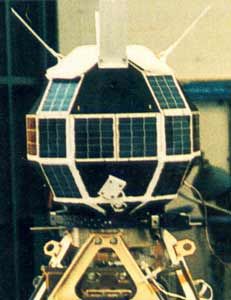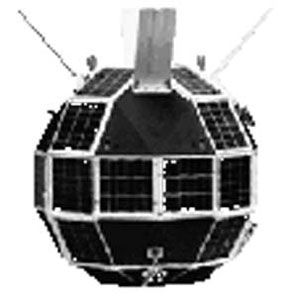GLOMR (original) (raw)

Home - Search - Browse - Alphabetic Index: 0- 1- 2- 3- 4- 5- 6- 7- 8- 9
A- B- C- D- E- F- G- H- I- J- K- L- M- N- O- P- Q- R- S- T- U- V- W- X- Y- Z
GLOMR

GLOMR
Credit: Manufacturer Image
American military store-dump communications satellite. Experimental communication satellite built by DSI, Rockwell for DARPA, USAF STP (Space Test Program), USA. Launched 1985. Used GLOMR Bus (62-sided polyhedron, unstabilized, body mounted solar cells).
AKA: SECS. Status: Operational 1985. First Launch: 1985-04-29. Last Launch: 1990-04-05. Number: 3 . Gross mass: 52 kg (114 lb). Height: 0.60 m (1.96 ft).
GLOMR (Global Low Orbiting Message Relay) was a DARPA project designed to demonstrate the ability to read out, store, and forward data from remote ground-based sensors.
The satellite was first scheduled for deployment from STS-51B, but a battery problem forced a return to Earth for repair. Reflown and deployed from STS-61A, the vehicle finally re-entered after 14 months. The total price was less than 1 million dollars. The spacecraft was a small, 62-sided polyhedron, and unstabilized. The design included redundant transmitters, receivers, batteries, and battery charge control systems. It had two CMOS microprocessors - one for communications control, the other for scheduling, mass memory, housekeeping, and mission control, telemetry, and command functions.
The SECS (Special Experimental Communications System) or GLOMR 2 was an improved digital store and forward communications spacecraft for a classified mission. The design was similar to GLOMR with more data storage, greater redundancy, and more space qualified hardware content. SECS was the first spacecraft launched on the air-launched Pegasus launch vehicle. The spacecraft operated for 3.5 years. The spacecraft had a spherical structure, and was unstabilized with body mounted solar cells. The payload was to GLOMR.
More at: GLOMR.
Subtopics
Family: Communications, Military store-dump comsat. Country: USA. Launch Vehicles: Space Shuttle, Pegasus. Launch Sites: Cape Canaveral, Cape Canaveral LC39A, Point Arguello WADZ. Agency: USN, DARPA, CTA Space Systems. Bibliography: 2, 279, 6.
Photo Gallery
 |
PegsatCredit: Manufacturer Image |
|---|
1985 April 29 - . 16:02 GMT - . Launch Site: Cape Canaveral. Launch Complex: Cape Canaveral LC39A. Launch Platform: MLP2. LV Family: Shuttle. Launch Vehicle: Space Shuttle.
- GLOMR - . Nation: USA. Agency: NASA. Program: STS. Spacecraft: GLOMR. Decay Date: 1985-05-06 . USAF Sat Cat: 15665 . COSPAR: 1985-034xx. Apogee: 359 km (223 mi). Perigee: 346 km (214 mi). Inclination: 57.00 deg. Period: 91.60 min.
1985 October 30 - . 17:00 GMT - . Launch Site: Cape Canaveral. Launch Complex: Cape Canaveral LC39A. Launch Platform: MLP1. LV Family: Shuttle. Launch Vehicle: Space Shuttle.
- GLOMR; GLOMAR - . Payload: Challenger F9 / GLOMR 1. Mass: 52 kg (114 lb). Nation: USA. Agency: USN. Class: Communications. Type: Military communications satellite. Spacecraft: GLOMR. Decay Date: 1986-12-26 . USAF Sat Cat: 16231 . COSPAR: 1985-104B. Apogee: 332 km (206 mi). Perigee: 317 km (196 mi). Inclination: 57.00 deg. Period: 91.00 min. Released from STS 61A 11/1/85. Spacecraft engaged in research and exploration of the upper atmosphere or outer space (US Cat B)..
1990 April 5 - . 19:10 GMT - . Launch Site: Point Arguello. Launch Complex: Point Arguello WADZ. Launch Pad: Aircraft from Edwards.. Launch Platform: NB-52 008. Launch Vehicle: Pegasus.
- USA 55 - . Payload: GLOMR 2 / TERCEL / SECS. Mass: 25 kg (55 lb). Nation: USA. Agency: DARPA. Class: Communications. Type: Military communications satellite. Spacecraft: GLOMR. USAF Sat Cat: 20547 . COSPAR: 1990-028B. Apogee: 642 km (398 mi). Perigee: 477 km (296 mi). Inclination: 94.10 deg. Period: 95.90 min. Store and forward. Air dropped in Point Arguello WADZ..
Home - Search - Browse - Alphabetic Index: 0- 1- 2- 3- 4- 5- 6- 7- 8- 9
A- B- C- D- E- F- G- H- I- J- K- L- M- N- O- P- Q- R- S- T- U- V- W- X- Y- Z
© 1997-2019 Mark Wade - Contact
© / Conditions for Use